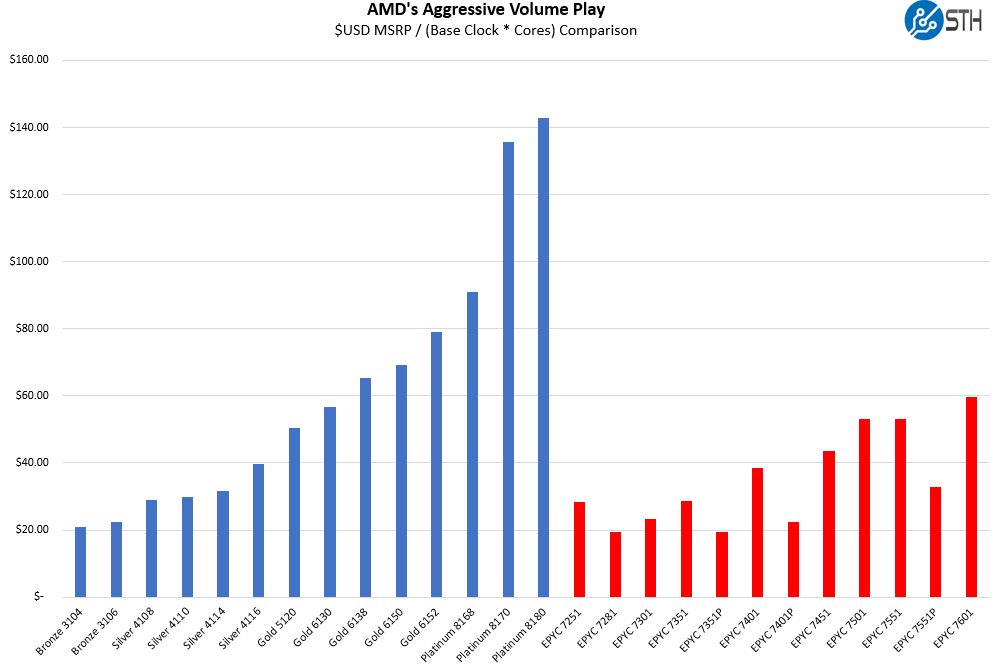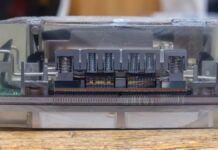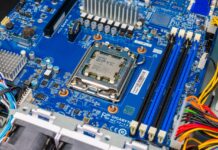AMD EPYC 7501 Power Consumption
The other side of the equation is power consumption. The AMD EPYC 7451 is putting up some impressive benchmark numbers, but that does have an associated cost. Here is what we saw on our PDU after a few runs:
- Idle: 79W
- 70% Load: 231W
- 100% Load: 277W
- Peak: 359W
Note these results were taken using a 208V Schneider Electric / APC PDU at 17.8C and 71% RH. Our testing window shown here had a +/- 0.3C and +/- 2% RH variance. The figures are certainly more than the Intel Xeon Silver line, but with that extra power consumption, AMD is delivering a more expandable platform and more performance.
AMD EPYC 7501 Market Positioning
AMD has a number of competitive vectors. The obvious competition is the Intel Xeon Scalable line. AMD also has P series parts that compete in this market.
AMD EPYC 7501 v. Intel Xeon
Performance wise, the AMD EPYC 7501 is something special. The price per core metric of the AMD EPYC 7501 is well under what Intel charges for 20 core and higher parts. In many workloads, the sheer number of cores, plus the eight memory channels lead to easy performance crowns for AMD over Intel. The other side of the equation is that a single AMD EPYC 7501 CPU has more than double the number of PCIe lanes available versus the Intel Xeon Scalable CPU. At around $3600, Intel simply does not have an offering that can compete with AMD’s scale on a single socket platform.

If you want to look at what AMD is doing in terms of single socket pricing, across its line and with respect to Intel, check out AMD EPYC’s Extraordinarily Aggressive Single Socket Mainstream Pricing.
AMD EPYC 7501 v. AMD EPYC
If you are going single socket, it is hard for us to recommend an AMD EPYC 7501. If you are installing a single CPU in a dual socket system with the intent of installing a second later, then it makes sense. If you have a purely single socket platform, the AMD EPYC 7551P with 32 cores and 64 threads, offers slightly higher clocks at a lower price. The EPYC 7551P is limited to single socket only configurations so it is not a competitor to the EPYC 7501 in dual socket configurations. Otherwise, there is a huge step up from the AMD EPYC 7451 24-core part to the 7501 because you get an additional 8 cores or 33% more. If you are paying for licensing on a per server or per socket basis, the 32-core AMD EPYC 7501 allows greater platform consolidation than the lower-end EPYC alternatives.
Final Words
This is a strong offering. The AMD EPYC 7501 shows the power that AMD has. It can offer more cores, more memory channels, more than twice the PCIe lanes in a single socket configuration than Intel can. Some Intel Xeon Scalable offerings are better suited for per-core software licensing. If your software is licensed per node (e.g. Docker Enterprise) or per socket (e.g. VMware) then the fact that you can simply get more with the AMD EPYC 7501 in the $3600 range makes it extremely compelling.




“Here AMD EPYC is performing well but this is one where the dual port FMA Xeon AVX-512 is a big advantage.”
NAMD Performance on Xeon-Scalable 8180 and 8 GTX 1080Ti GPUs on Pugetsystems.
I don’t know how much Servethehome gets from parties to mention the pro’s of AVX-512, compared with a GPU it is totally useless.
There are a lot of new HPC applications being tuned for AVX-512. Just using GROMACS, the example you are focusing on, here is what one of the lead devs of GROMACS affirmed to you the last time you posted a similar comment about a month ago: https://www.servethehome.com/intel-xeon-gold-6132-benchmarks-and-review/
Even the ARM vendors we work with acknowledge AVX-512 is getting a lot of attention.
Is this review done with Spectre and Meltdown mitigations in place?
Is there any chance of an ffmpeg encode benchmark to be added in the future? It would be very interesting to see how AMD compares against Intel given that video encoding/streaming is such a key workload that demands large scale CPU capacity. I’m more than happy to work together in setting the parameters for such a benchmark and supply quality media for the best comparable results.
David, happy to take a look at what you have. Docker container perhaps?
Are they benchmarks for all of the processors available somewhere? I’m particularly interested in the NAMD and Gromacs results.
Thanks!
“Even the ARM vendors we work with acknowledge AVX-512 is getting a lot of attention.”
I would do the same when I couldn’t get my hands on GPU IP.
($20k)1x 8180 + 1x Tesla V100 has at least the same speed with these kind of calculations (fp32 and fp64) as ($50k)5x 8180. With optimized software the difference will be even bigger.
@patrick @david I use this as a media encoding benchmark for a site I write for. https://nwgat.ninja/thefireescape/ It’s built on FFMPEG and supports both an x264 and x265 export, the included scripts run it for 5 runs and I have seen variances thanks to the presence of AVX on newer cpu’s
Daniel, thank you for the input. We have run that. It is not something we can use due to it being Windows-based and the fact it does not scale well. We have a set of criteria a benchmark must meet and that was hitting scaling limits by only 12 cores. For consumer CPUs, it may be useful. It can potentially be useful for multiple streams if logic is built to do QoS in transcoding spinning up multiple containers. Sadly, it is far from making the cut on what we can use at this point. I do want a x265 benchmark but am still looking for a good one.
Ahh I didn’t know how hard it would be to move to linux, shotcut itself is foss and is built for linux as well although that particular benchmark was built for windows I thought the python logic would be portable. That said it seems to scale well past 12 cores(I use a 12 core workstation at home and have seen it exhibit scaling on some of the 16 core systems at work) Although that could be something related to the varying versions of ffmpeg(or I just didn’t notice the changes at 16 cores you’re the expert there not me XD)
I’d love to start seeing some Computation Fluid Dynamics benchmarks for Epyc. It’s memory bandwidth should make the chips competitive…
Could you clarify the differences between the 7501 and 7551? The specs don’t seem to make sense, the 7501 is listed at lower TDP, a higher all core turbo, and a lower price than the 7551. I must be missing something, clearly, but what?
+1 for encoding benchmarks!